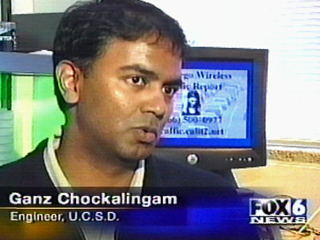Calit2 Wireless Traffic Report for San Diego Motorists Tops 25,000 Calls Per Month
April 2, 2004 / By Doug Ramsey
|
San Diego, CA, April 2, 2004 -- More than 5,000 people are now regularly using a toll-free wireless traffic information service that allows motorists to get real-time information on traffic speeds and delays along the major highways they travel in San Diego County. According to developers of the service at the University of California, San Diego, the San Diego Wireless Traffic Report now receives between 25,000 and 30,000 calls per month. "We have just recently moved from an experimental system to a full-scale service that is free of charge to San Diego consumers," said Ganz Chockalingam, senior researcher in the UCSD division of the California Institute for Telecommunications and Information Technology [Calit²]. "Our technology allows us to take up to one-thousand simultaneous calls, and as more motorists become aware of the service, we can scale up to a million calls per day."
The service was also showcased Motorists can access data on highway speeds by dialing a toll-free number, (866) 500-0977, 24 hours a day, seven days a week. The speech-recognition system prompts the caller to specify a major freeway, and the voice-activated service report average traffic speeds at various intersections where there are delays. The raw data comes from Caltrans, which uses sensors embedded in the highways to track the number of cars passing overhead. The data is then converted into speed information, which in turn is converted into voice signals for delivery by phone.
Consumers who want to access the system on a regular basis can also establish a customized commute profile online at http://traffic.calit2.net." All you have to do is put in your phone number and details on which highways you use for your morning and evening commutes," said Chockalingam. "From then on, the system will automatically recognize your number when you call in, and immediately provide traffic flow details tailored to your route." Users can also input alternate routes. (Most major San Diego highways are covered by Caltrans sensors, with two notable exceptions: I-52 between I-15 and I-5, and I-5 South from the airport to the border with Mexico.)
The experimental service was originally deployed at the request of the San Diego Police Department during Super Bowl XXXVII. Law-enforcement officials wanted a way to monitor traffic conditions around Qualcomm Stadium and nearby highways from their cell phones.
 The traffic information system is the first of its kind, and officials outside of San Diego are looking at the technology as a possible component of future metropolitan '5-1-1' services. The federal government issued a mandate that major cities develop 511 numbers to provide consumers with travel-related information through a toll-free phone number. The federal mandate, though, is unfunded and only a few cities have been willing to spend the money to establish such services. "The Bay Area is one of the few 511 services already available, but it does not permit anything like the level of customization for commuters that the Calit² service permits," notes Chockalingam. "Hopefully when San Diego decides to implement a 511 number, the technology and features we have developed for the Wireless Traffic Report will become part of that wider service."
The traffic information system is the first of its kind, and officials outside of San Diego are looking at the technology as a possible component of future metropolitan '5-1-1' services. The federal government issued a mandate that major cities develop 511 numbers to provide consumers with travel-related information through a toll-free phone number. The federal mandate, though, is unfunded and only a few cities have been willing to spend the money to establish such services. "The Bay Area is one of the few 511 services already available, but it does not permit anything like the level of customization for commuters that the Calit² service permits," notes Chockalingam. "Hopefully when San Diego decides to implement a 511 number, the technology and features we have developed for the Wireless Traffic Report will become part of that wider service."
The traffic report -- funded and "powered by Calit²" -- was featured this week on "FOX Connect," a weekly report on Fox6 News, produced in conjunction with UCSD Connect. Jennifer Brandt's piece is now available in streaming video [RealOne or RealPlayer required] at http://rpvss.ucsd.edu:8080/ramgen/calit2/ch6traffic.rm. Separately, Chockalingam was interviewed today on the morning news of CBS affiliate KFMB-TV; to watch that interview with anchor Dan Shadwell, go to http://rpvss.ucsd.edu:8080/ramgen/calit2/ch8traffic.rm.
# # #

